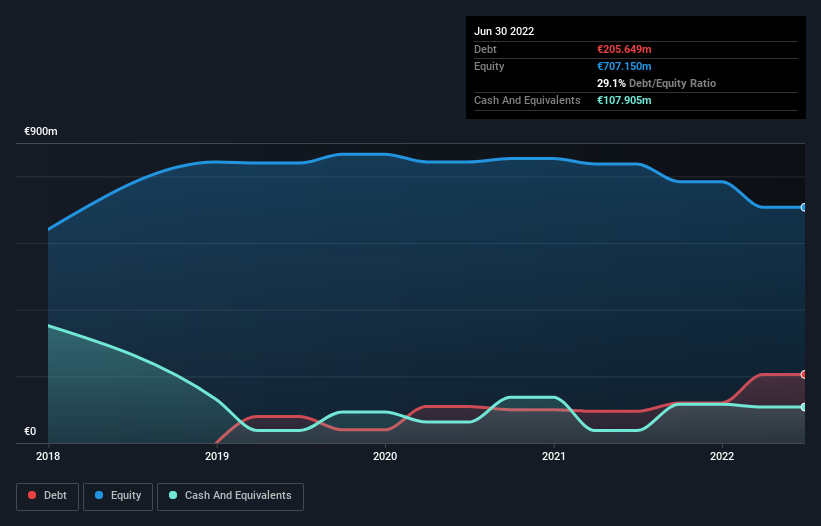The external fund manager backed by Berkshire Hathaway's Charlie Munger, Li Lu, makes no bones about it when he says 'The biggest investment risk is not the volatility of prices, but whether you will suffer a permanent loss of capital.' So it seems the smart money knows that debt - which is usually involved in bankruptcies - is a very important factor, when you assess how risky a company is. Importantly, Glenveagh Properties PLC (ISE:GVR) does carry debt. But is this debt a concern to shareholders?
When Is Debt Dangerous?
Debt and other liabilities become risky for a business when it cannot easily fulfill those obligations, either with free cash flow or by raising capital at an attractive price. In the worst case scenario, a company can go bankrupt if it cannot pay its creditors. However, a more frequent (but still costly) occurrence is where a company must issue shares at bargain-basement prices, permanently diluting shareholders, just to shore up its balance sheet. Of course, debt can be an important tool in businesses, particularly capital heavy businesses. When we think about a company's use of debt, we first look at cash and debt together.
View our latest analysis for Glenveagh Properties
How Much Debt Does Glenveagh Properties Carry?
As you can see below, at the end of June 2022, Glenveagh Properties had €205.6m of debt, up from €94.9m a year ago. Click the image for more detail. However, it does have €107.9m in cash offsetting this, leading to net debt of about €97.7m.

How Strong Is Glenveagh Properties' Balance Sheet?
According to the last reported balance sheet, Glenveagh Properties had liabilities of €91.6m due within 12 months, and liabilities of €195.9m due beyond 12 months. Offsetting these obligations, it had cash of €107.9m as well as receivables valued at €38.1m due within 12 months. So its liabilities total €141.5m more than the combination of its cash and short-term receivables.
This deficit isn't so bad because Glenveagh Properties is worth €613.5m, and thus could probably raise enough capital to shore up its balance sheet, if the need arose. But it's clear that we should definitely closely examine whether it can manage its debt without dilution.
We measure a company's debt load relative to its earnings power by looking at its net debt divided by its earnings before interest, tax, depreciation, and amortization (EBITDA) and by calculating how easily its earnings before interest and tax (EBIT) cover its interest expense (interest cover). Thus we consider debt relative to earnings both with and without depreciation and amortization expenses.
Glenveagh Properties's net debt to EBITDA ratio of about 1.6 suggests only moderate use of debt. And its commanding EBIT of 10.6 times its interest expense, implies the debt load is as light as a peacock feather. Even more impressive was the fact that Glenveagh Properties grew its EBIT by 203% over twelve months. That boost will make it even easier to pay down debt going forward. When analysing debt levels, the balance sheet is the obvious place to start. But ultimately the future profitability of the business will decide if Glenveagh Properties can strengthen its balance sheet over time. So if you're focused on the future you can check out this free report showing analyst profit forecasts.
Finally, a company can only pay off debt with cold hard cash, not accounting profits. So we always check how much of that EBIT is translated into free cash flow. Happily for any shareholders, Glenveagh Properties actually produced more free cash flow than EBIT over the last three years. There's nothing better than incoming cash when it comes to staying in your lenders' good graces.
Our View
Glenveagh Properties's conversion of EBIT to free cash flow suggests it can handle its debt as easily as Cristiano Ronaldo could score a goal against an under 14's goalkeeper. And the good news does not stop there, as its EBIT growth rate also supports that impression! Zooming out, Glenveagh Properties seems to use debt quite reasonably; and that gets the nod from us. After all, sensible leverage can boost returns on equity. Another factor that would give us confidence in Glenveagh Properties would be if insiders have been buying shares: if you're conscious of that signal too, you can find out instantly by clicking this link.
Of course, if you're the type of investor who prefers buying stocks without the burden of debt, then don't hesitate to discover our exclusive list of net cash growth stocks, today.
New: Manage All Your Stock Portfolios in One Place
We've created the ultimate portfolio companion for stock investors, and it's free.
• Connect an unlimited number of Portfolios and see your total in one currency
• Be alerted to new Warning Signs or Risks via email or mobile
• Track the Fair Value of your stocks
Have feedback on this article? Concerned about the content? Get in touch with us directly. Alternatively, email editorial-team (at) simplywallst.com.
This article by Simply Wall St is general in nature. We provide commentary based on historical data and analyst forecasts only using an unbiased methodology and our articles are not intended to be financial advice. It does not constitute a recommendation to buy or sell any stock, and does not take account of your objectives, or your financial situation. We aim to bring you long-term focused analysis driven by fundamental data. Note that our analysis may not factor in the latest price-sensitive company announcements or qualitative material. Simply Wall St has no position in any stocks mentioned.
About ISE:GVR
Glenveagh Properties
Glenveagh Properties PLC, together with its subsidiaries, constructs and sells houses and apartments for the private buyers, local authorities, and the private rental sector in Ireland.
Solid track record with excellent balance sheet.
Similar Companies
Market Insights
Community Narratives



